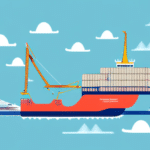Understanding FOB Shipping Point: Definition and Importance
FOB Shipping Point is a critical term in the shipping and logistics industry, representing the point at which ownership and responsibility for goods transfer from the seller to the buyer. "FOB" stands for "Free on Board," indicating that the buyer assumes ownership once the goods are loaded onto the shipping carrier at the seller's location. This distinction is essential for businesses to manage risks, costs, and responsibilities effectively during transactions.
Definition of FOB Shipping Point
FOB Shipping Point signifies that the buyer is responsible for the goods as soon as they leave the seller's premises. This includes any potential damages or losses that occur during transit. Understanding this term helps businesses clearly define their obligations and avoid disputes related to shipping and delivery.
Importance in Business Transactions
Properly understanding FOB Shipping Point ensures that both buyers and sellers are aware of their responsibilities, influencing decisions on shipping methods, insurance, and cost management. It is a fundamental aspect of contract negotiations and can significantly impact the overall cost and risk associated with a transaction.
Comparing FOB Shipping Point with FOB Destination
While FOB Shipping Point and FOB Destination are both terms that define the transfer of ownership, they differ in crucial aspects that affect how businesses handle logistics and responsibilities.
Key Differences
- Ownership Transfer: Under FOB Shipping Point, ownership transfers when the goods are shipped. In contrast, FOB Destination transfers ownership upon delivery to the buyer's location.
- Shipping Costs: With FOB Shipping Point, the buyer typically bears the shipping costs, whereas under FOB Destination, the seller covers these costs until delivery.
- Risk of Loss: The buyer assumes the risk of loss or damage during transit with FOB Shipping Point, while the seller retains this risk until the goods reach the destination under FOB Destination.
Implications for Businesses
Choosing between FOB Shipping Point and FOB Destination affects cost allocation, risk management, and the overall logistics strategy. Businesses must evaluate which term aligns best with their operational capabilities and financial considerations.
The Historical Context and Legal Framework of FOB Shipping Point
The concept of FOB Shipping Point has evolved over time, becoming a standardized term within the shipping industry and regulated under legal frameworks like the Uniform Commercial Code (UCC).
Origins and Evolution
Originally stemming from maritime shipping, FOB Shipping Point has expanded beyond sea transportation to include land and air freight. Its adoption by the UCC in Article 2 provides a legal foundation that standardizes its application across various states in the United States.
Legal Implications
Under the UCC, FOB Shipping Point dictates the precise moment ownership and risk transfer, ensuring both parties have clear legal guidelines. Misinterpretation or incorrect usage of FOB terms can lead to significant legal disputes and financial liabilities.
Key Components and Responsibilities in FOB Shipping Point Agreements
FOB Shipping Point agreements encompass several critical components that define the responsibilities of both buyers and sellers during a transaction.
Point of Transfer of Ownership
The primary component is the exact moment when ownership transfers from the seller to the buyer, typically at the shipping point. This dictates who bears responsibility for the goods during transit.
Payment of Shipping Costs
Under FOB Shipping Point, the buyer is generally responsible for all shipping costs once the goods are dispatched. This includes freight charges, insurance, and any additional fees incurred during transportation.
Risk of Loss or Damage
The buyer absorbs the risk of loss or damage once the goods are handed over to the shipping carrier. Sellers must ensure that the goods are adequately prepared and documented before dispatching.
Legal Significance
Clearly defining these components in contracts helps prevent misunderstandings and ensures that both parties are aware of their legal and financial obligations.
Advantages and Disadvantages of FOB Shipping Point
Like any business term, FOB Shipping Point comes with its own set of benefits and drawbacks that businesses must consider when choosing their shipping terms.
Pros
- Cost Control for Sellers: Sellers can manage shipping logistics and potentially negotiate better rates by handling bulk shipments.
- Buyer Flexibility: Buyers have the freedom to choose their preferred carriers and control the shipping process once ownership is transferred.
- Clear Responsibility: Clear delineation of responsibilities helps in effective risk management and reduces potential disputes.
Cons
- Increased Risk for Buyers: Buyers bear the risk of loss or damage during transit, which may lead to higher insurance costs.
- Potential for Higher Costs: Buyers might face higher overall costs if shipping rates rise or if unexpected damages occur during transit.
- Logistical Challenges: Buyers need to have robust logistics and tracking systems in place to manage shipments effectively.
Best Practices for Negotiating FOB Shipping Point Terms
To maximize the benefits and minimize the risks associated with FOB Shipping Point, businesses should adopt strategic approaches during negotiations.
Preparation and Research
Thoroughly understand the implications of FOB Shipping Point and assess your company's capacity to handle responsibilities post-shipping. Research current shipping rates and carrier reliability to make informed decisions.
Negotiating Shipping Costs
Consider negotiating bulk shipping discounts or establishing predetermined freight rates with specific carriers to control costs effectively.
Insurance and Risk Management
Ensure that adequate insurance coverage is in place to protect against potential loss or damage during transit. Clearly outline insurance responsibilities in the contract.
Clear Contract Terms
Draft contracts with precise definitions of FOB terms, responsibilities, and liabilities to prevent misunderstandings and legal disputes.
The Role of Freight Forwarders and Technology in FOB Shipping Point
Freight forwarders and technological advancements play pivotal roles in enhancing the efficiency and reliability of FOB Shipping Point transactions.
Freight Forwarders
Freight forwarders act as intermediaries, managing the logistics of shipping goods from the seller to the buyer. They leverage their industry expertise and carrier relationships to optimize shipping routes, reduce costs, and ensure timely deliveries.
Technological Innovations
Modern technologies, such as real-time tracking systems, automated documentation, and digital communication platforms, have revolutionized FOB Shipping Point transactions. These advancements provide greater transparency, improve coordination, and enhance the overall efficiency of the shipping process.
Impact on Efficiency and Transparency
Technology facilitates real-time updates and data analytics, allowing both buyers and sellers to monitor shipments, predict delivery times, and respond promptly to any issues that arise during transit.
Avoiding Common Mistakes in FOB Shipping Point Transactions
Successful FOB Shipping Point transactions require attention to detail and adherence to best practices. Avoiding common pitfalls can save businesses from costly errors and disputes.
Clarifying the Transfer Point
Clearly define the exact point of transfer in the contract to avoid ambiguity. This ensures both parties understand when ownership and responsibility shift.
Understanding Shipping Costs Allocation
Ensure that the allocation of shipping costs is explicitly stated in the agreement to prevent unexpected expenses.
Proper Insurance Coverage
Insure goods adequately to protect against potential loss or damage during transit. Verify that insurance terms align with the FOB Shipping Point agreement.
Due Diligence on Carriers
Research and select reliable carriers with proven track records to minimize risks associated with shipping delays or damage.
Clear Communication with Freight Forwarders
Provide detailed instructions and maintain open communication channels with freight forwarders to ensure smooth coordination and execution of shipping plans.
Conclusion: Mastering FOB Shipping Point for Successful Business Transactions
FOB Shipping Point is a fundamental aspect of business transactions that delineates ownership, responsibility, and cost allocation between buyers and sellers. By understanding its components, advantages, and potential pitfalls, businesses can effectively manage risks and optimize their shipping strategies. Adopting best practices, leveraging technology, and ensuring clear contractual agreements are essential steps toward mastering FOB Shipping Point transactions and achieving successful business outcomes.






















